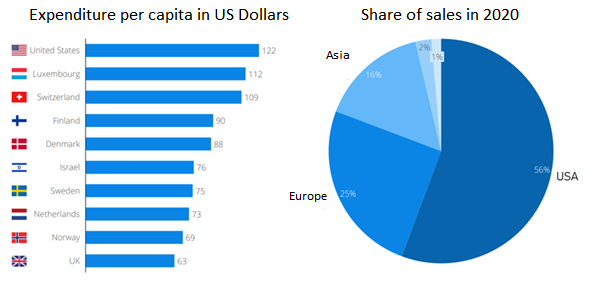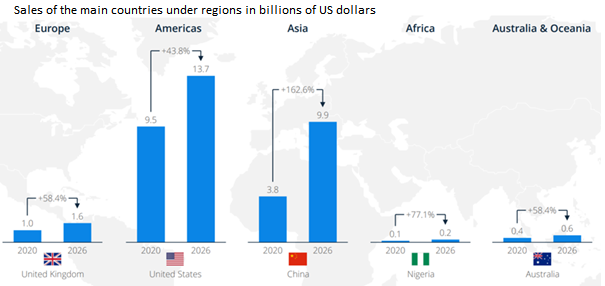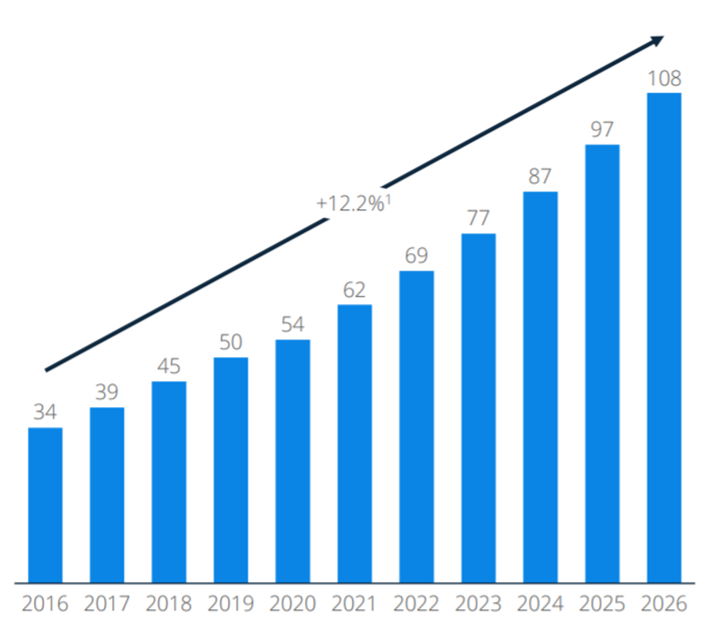By Marco Oehrl and Robert Zach
Investing.com - With the increasing digitalization of the working world, the importance of cybersecurity is also growing. The days when industrial espionage was committed with small cameras and microfilm are long behind us. The new enemies are USB sticks, Wi-Fi and Bluetooth interfaces, and internet access. This means danger for end users, but also enormous growth opportunities for companies addressing this problem that could lead to meaningful market returns.
Although the ETFMG Prime Cyber Security ETF (HACK) - which counts industry giants such as Cisco (NASDAQ:CSCO), Palo Alto and Cloudflare (NYSE:NET) among its top holdings - gained only 2.5 percent in 2021, the return in 2020 was a whopping 38 percent. And isn't it often the case in the stock market that bad phases are followed by good ones, especially in an area as promising as the cybersecurity market?
A Closer Look
There must be hardly anyone who owns a PC and has never had a problem with a virus or Trojan. Those who say they haven’t had a virus probably just didn’t notice its effects.
At a time when almost every device can be connected to the internet, cybersecurity is becoming a commodity on which more and more money is being spent.
The revenue generated in this sector in 2020 amounted to $118 billion worldwide. Hardware accounted for 20 percent, software 35 percent, and IT services 45 percent.
By 2026, the industry expects sales to increase to $210 billion, representing a compound annual growth rate (CAGR) of 10.6 percent.
What role does software play in cybersecurity growth?
In the software segment, the U.S. was the undisputed spending leader in 2020. Of the $41 billion spent globally on software to improve security, the U.S. accounted for 56 percent. This equated to a per capita spend for each employee of $122.

Source: Cybersecurity Software Report 2021
https://de.statista.com/statistik/studie/id/104227/dokument/software-report/
Europe, on the other hand, accounted for only 25 percent, while Asia lagged far behind with 16 percent.
For the period from 2020 to 2026, a CAGR of 7.0 percent is expected for this segment.
Compared to the CAGR of the entire cybersecurity industry of 10.6 percent, software solutions still seem to play a smaller role.
However, this does not necessarily mean that an investment in the software sector cannot be worthwhile.
While the CAGR for the period from 2016 to 2026 is 8.1 percent in Europe and 7.8 percent in the U.S., a race to catch up seems to be underway in Asia with 10.4 percent.
The positive trend in Asia becomes even clearer when looking at total cybersecurity spending. This is expected to increase from $28.1 billion to $56.3 billion between 2021 and 2026. That represents an overall increase of more than 100 percent.
What's particularly interesting about this is that software segment revenue in Asia will "only" increase by 55.7 percent from $7.0 billion to $10.9 billion over the same period. This shows that the hardware and IT services segments are benefiting disproportionately.
This is also made clear by the fact that the share of software in the overall Asian cybersecurity market is expected to fall from 24.9 to 19.4 percent in the period from 2021 to 2026.
The U.S. and Europe cannot keep up with the growth of the Asian cybersecurity market anyway, with sales estimated to increase by a comparatively meager 34.3 and 37.2 percent, respectively.
Cybersecurity hardware - who is ahead?
With a 20 percent share of the overall cybersecurity market, the hardware segment is the smallest piece of the pie, but a CAGR of 9.2 percent between 2020 and 2026 promises more growth than the software segment.
There is also a clear shift in market share in this area. Of the $23 billion in total sales reached in 2020, the U.S. accounted for 47 percent, Asia 28 percent and Europe only 21 percent.
However, while hardware sales in Europe and the U.S. are expected to grow by only 36.4 and 32.7 percent, respectively, between 2021 and 2026, Asia is expected to increase from $7.7 billion to $15.2 billion, or 97.4 percent. This clearly indicates that Asia could be the market with the highest growth rates for cybersecurity.

https://de.statista.com/statistik/studie/id/104221/dokument/hardware-report/
The undisputed number one in hardware growth is China. Spending there is expected to increase by 162.6 percent from 2020 to 2026.
IT services signal biggest growth
Sales of IT services play the biggest role of all in cybersecurity. It's no wonder, either, as without expert personnel, the best software and hardware aren't much use.
This is also where the largest growth is expected worldwide. From sales of $54 billion in 2020, the market is expected to rise to $108 billion by 2026, a CAGR of 12.2%.

https://de.statista.com/statistik/studie/id/104222/dokument/it-services-report/
In Europe, IT services sales are expected to climb from $19.7 billion to $32.2 billion (63.5 percent) between 2021 and 2026, and in the U.S. from $25.3 billion to $40.7 billion (60.9 percent).
Asia, on the other hand, may also outpace the rest of the world in the cybersecurity IT services sector. Over the same period, revenues are expected to increase from $13.4 billion to $30.2 billion, representing growth of 125.4 percent.
All in all, it can be stated that Asia is likely to be the next big growth driver for the cybersecurity market. However, the solid growth rates in the USA and Europe should not be ignored.
Let's take a look at the fifteen cybersecurity stocks that Wall Street analysts believe have the greatest upside potential over the next twelve months.
Investing.com used our stock screener for this, filtering for stocks from the cybersecurity sector that are followed by at least five analysts and have at least five buy recommendations and where there is the greatest upside potential. We looked for stocks with a minimum of $2 billion market cap. Here’s our list:
-
Varonis Systems (NASDAQ:VRNS) (average price target in 12M: $74.68 / +55.40%)
-
Cloudflare Inc (NYSE:NET) (average target price in 12M: $207.28 / +51.26%)
-
Splunk (NASDAQ:SPLK) (average target price in 12M: $167.29 / +47.72%)
-
Crowdstrike Holdings Inc (NASDAQ:CRWD) (average target price in 12M: $68.53 / +43.80%)
-
Sailpoint Technologies Holdings Inc (NYSE:SAIL) (average target price in 12M: $68.53 / +43.44 %)
-
SentinelOne Inc (NYSE:S) (average target price in 12M: $68.14 / +34.09%)
-
CyberArk Software (NASDAQ:CYBR) (average target price in 12M: $218.86 / +33.03%)
-
Leidos Holdings (NYSE:LDOS) (average target price in 12M: $116.90 / +31.82%)
-
Okta (NASDAQ:OKTA) (average target price in 12M: $282.54 / +29.20%)
-
Zscaler (NASDAQ:ZS) (average target price in 12M: $393.60 / +29.13%)
-
Rapid7 (NASDAQ:RPD) (average target price in 12M: $145.13 / +24.26%)
-
Tenable Holdings (NASDAQ:TENB) (average target price in 12M: $65 / +22.60%)
-
SAIC (NYSE:SAIC) (average target price in 12M: $100.50 / +20.14%)
-
CACI International Inc (NYSE:CACI) (average target price in 12M: $321.22 / +19.81%)
-
Booz Allen (NYSE:BAH) Hamilton (average target price in 12M: $97 / +16.5%)
Note: All calculations refer to the respective closing price on December 15, 2021.
Here are the three standout names:
Varonis Systems shares hold the greatest potential
According to Wall Street analysts, Varonis Systems, a specialist in the field of data security and analysis, has the greatest share price potential in the cybersecurity sector over the next twelve months. The 20 analysts surveyed by Investing.com estimate the price potential of Varonis Systems shares at 55.4 percent. Of these, 16 are buy recommendations and 4 holds. There are no sell recommendations.
In the third quarter, the company's revenue increased 31 percent year-over-year to $100.4 million. Subscription revenues were up 59 percent to $70 million. Non-GAAP profit was $8.1 million, up from $3.1 million in the year-ago quarter.
RBC Capital Markets analyst Matthew Hedberg believes Varonis's product business in the areas of data governance and insider threat management could be converted to a subscription model, which could significantly increase subscription revenue. The expert has high hopes for the company's potential to service both on-premises and cloud data stores. For the third quarter, Varonis reported ARR growth of 36 percent. Hedberg sees the cybersecurity specialist in a promising position for 2022 and beyond, especially given strong demand in the near term and longer-term growth drivers in the form of digitization of the economy and cloud migration.
RBC rates Varonis stock "outperform" with an $82 price target.
For the coming year, Varonis expects revenue to be between $383.5 million and $386.5 million, up 31-32 percent. Earnings on a non-GAAP basis are expected to be between $19.5 million and $21.5 million.
Cloudflare shares with over 50 percent return potential
The next stock on the list is Cloudflare. It has already risen more than 73 percent in 2021, and much more at one point to $221.64, but has recently come under some pressure due to valuation concerns expressed by JP Morgan regarding the Fed's upcoming tightening cycle, and is currently trading at $131.87.
JP Morgan believes Cloudflare could emerge as one of the largest revenue generators in its coverage within the next 10 to 15 years, after all, the company is positioning itself as the "fourth cloud" after Amazon (NASDAQ:AMZN), Microsoft (NASDAQ:MSFT) and Google (NASDAQ:GOOGL), CNBC reported. However, with Cloudflare "the most expensive stock in our coverage" and multiples in the software space expected to decline, JP Morgan lowered its rating to "sell" from "hold."
If one believes the bulk of Wall Street analysts, though, the recent correction already represents a buying opportunity. On average, the analysts assume a price target of $207.28 - which corresponds to an upside potential of just under 51.26 percent in the next twelve months.
According to RBC Capital Markets, Cloudflare's total addressable market could swell to around $100 billion by 2024. 5G mobile networks and the "Internet of Things" should increase this market even further. RBC rates Cloudflare stock "Outperform" with a $220 price target.
Cloudflare reported third-quarter revenue of $172.3 million, up 51 percent year over year. On a non-GAAP basis, the cybersecurity specialist posted a profit of $1.4 million, the first time in the company's history. "We had a landmark third quarter, with revenue growth up 51% year-over-year, and large customer growth up 71% year-over-year. Our strong growth and efficiency also propelled us to reach profitability this quarter, achieving that milestone a year ahead of our original timeline," Cloudflare CEO and co-founder Matthew Prince said in a press release.
For the fourth quarter, Cloudflare expects revenue of $184 million to $185 million.
Splunk stock could benefit greatly from cloud transformation
Another stock on the list is Splunk. The provider of operational intelligence software that monitors, analyzes and reports on real-time computer data has had a tumultuous year. The cybersecurity company's stock price, for example, has plunged more than 35 percent since the beginning of the year. Challenges such as cloud transformation and the surprise resignation of CEO Doug Merritt have put pressure on Splunk stock.
Still, the former highflier shouldn't be written off completely, especially since the company has already ventured into the cloud with the launch of Splunk Observability Cloud, though it faces massive competition from companies like Elastic (NYSE:ESTC) and Dynatrace (NYSE:DT).
In the third quarter of fiscal 2022 (the three months ending Oct. 31, 2021), total revenue rose 19 percent year over year to $665 million. Cloud revenue increased 68 percent to $243 million in the same period. Many customers are just switching from an on-premise model to the new Splunk software delivery in the cloud.
"With only a little more than a third of its revenue coming from the cloud, it will likely take some time for this transition to fully unfold," said an article on The Motley Fool.
The average price target of the 39 analysts surveyed by Investing.com is $167.29, nearly 48 percent above the current price. Twenty-three advise a buy, while 16 recommend a hold. It is particularly remarkable that despite the recent price turbulence, no one recommends selling the stock.
So if you have nerves of steel and enough patience, Splunk could be a bargain.
Alternatives: Other companies in the cybersecurity space that are also seen as having greater upside potential by analysts over a 12-month period are: Check Point Software (NASDAQ:CHKP) (+16.31%), Akamai (NASDAQ:AKAM) (+16.16%), NortonLifeLock (NASDAQ:NLOK) (+16.06%), Palo Alto Networks (NASDAQ:PANW) (+14.34%), and Fortinet (NASDAQ:FTNT) (+10.37%).
Read also: 3 Cutting-Edge Investment Themes To Watch For In 2022
See our full outlook series here.
